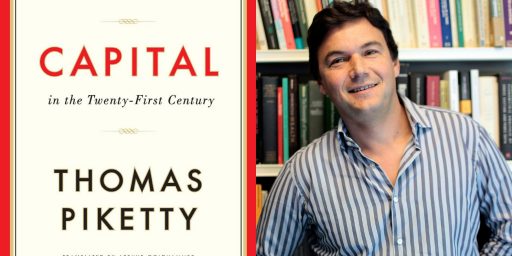The Politics of Immature Children
That is how I see much of the Left/Liberal view on income inequality. For example, Kevin Drum has written extensively on this topic and from what I can see he doesn’t tell us why this is so important. He writes things like, “it is toxic” and so forth, but never explains why. Now Ezra Klein has jumped in and written several articles on it. Klein writes,
The inequality conversation, which I often push, is an important one, but the left needs to decide what it is about inequality they don’t like. There are questions of justice, and there are also a number of problems that inequality can generate — lack of social cohesion, reduced economic mobility, class resentment, even ill health, to name just a few. But I tend to think the focus on inequality as a cause rather than an effect is wrongheaded. What worries me about inequality isn’t what it does, but what’s doing it, namely, a decades-long decline in worker bargaining power and the resultant redirection of productivity increases and corporate profits away from compensation and salaries.
He does point to some problems, but basically they almost all amount to, “it isn’t fair” (with ill health being the one exception). I find this kind of reasoning similar to what I see with my son, “He’s got more and it isn’t fair!” I expect this from my son as he about to turn 9. From adults, and well educated ones at that, it is a bit disappointing.
We see this even more plainly in the second article I linked too,
WHY INEQUALITY MATTERS. My friend Will Wilkinson is puzzled over the excess concern liberal economists express over inequality. He gets why they’d care about each individual’s well-being, but not why they’d worry about the gap between Tom and Bobby, assuming both of them have enough. I’m no liberal economist, but I sometimes play one on the blogs, so let me take a crack at it.
[snip]
To make the conclusion a bit clearer, liberal economists believe growth should be better shared, that the bottom quintiles are not getting enough due, possibly, to the inequality wedge. They don’t share the assumption that Tom and Bobby have enough, and they particularly dispute that, if they did, it would signal the end of the conversation.
The thing is, some level of inequality is probably necessary from an incentive stand point (I’m not going to get into this part of it, if you want to know why I think this way, follow the link). There is a “grown up” reason to be concerned about income inequality that deals with economic growth (see here, here here and here), but this doesn’t seem to be the problem for many on the Left. The people on the Left are concerned about collective bargaining, the decline of unions and union memberships, and stagnant wages.
And that last one brings up at least one issue I have with much of this discussion. Why focus on just one part of an employees pay and one that has recently not been a big focus in terms of news and politics? From an employers prespective the wage/salary that an employee is paid is only part of the cost of hiring that employee. There are also benefits which include 401k matching funds, and more importantly health care benefits. Could it be that wages are “stagnant since the 70’s” because health care costs have been rising pretty fast? That is, do these inequality warriors even think of looking at total compensation when looking at income inequality? My guess is no. Why is this important? Because health care benefits are likely the same for the highly paid CEO and the middle class cubicle jokey. As there are more cubicle jokeys and that they make less than CEOs, the health care benefit would tend to flatten the income distribution.
And here is another thing one should consider with income inequality from a dynamics perspective: immigration, in particular illegal immigration. If you add 800,000 low skilled workers to the population every year, then you might have increasing income inequality. Is this bad in the sense of Klein and Drum? I don’t see how, these illegal immigrants really, really want to be here. Sure their earnings put them at the bottom of the income distribution, but at the same time they are entering voluntarily.
Also, there is another issue that probably wont sit well with people on the Left/Liberals when it comes to inequality. What role does the rise of female headed households (or even single parent households) play in terms of income inequality? After all, if a woman gets divorced and has 2 kids and the husband was the primary source of income, then you’ve just added an additional household to the lower end of the income distribution. So, is single parent households part of the problem and if so, wouldn’t some of the Republican policies on promoting “traditional” households be the answer?
Overall, I find the discussion of income inequality by people on the Left side of the spectrum to be amazingly shallow. It sounds like a variant of the things I hear children complaining about in terms of who has more gum drops.





Posts like this are the reason why we look to you to raise the level of debate.
Steve, it is also perhaps useful to look at the motivation behind your son saying, “It isn’t fair.” Is it the same motivation used by those who want greater redistribution of income? I think it largely is.
I would also cite the studies on income mobility. Most of the mobility is related to the aging process. If you graphed earnings using chained dollars at age 16, 26, 36, 46, 56, 66, 76 for most people, you would find a bell shaped curve. But while being born poor/rich increases your odds of staying there, it is far from a given.
You can question the data and assumptions behind a definition of poverty and poor. If you say the criteria for poverty is that you don’t have enough to eat, shelter or clothe your self/family with no ‘extras’ (if you are paying for cable and also say you don’t have enough to eat, then the issue may not be the income but making rational choices), then income distribution disparity is an interesting question to look at. If you then look at those in that definition of poverty who aren’t receiving sufficient government aid and/or charity (e.g. food stamps, food pantry charities), that should also be a part of looking at income distribution.
If you next look at the external things most likely to cause a poverty cycle to continue (having to drop out of school for work, not being able to afford college, etc) you can see how much of the income distribution issue is poor choices versus societal structural issues.
Consider that the poverty rate as defined by the government (a much loser definition than what I have above) says for African Americans, poverty rates drop from 21.5% to 6.4% if you follow four rules (which used to be fairly common sense rules). 1) graduate from high school, 2) get a job and keep it before getting married, 3) get married and 4) don’t have babies until you get married and are at least 21. The only one of those that aren’t directly under your control (in most cases at least) is getting/keeping a job. But an unemployment rate of 4.4% would indicate that if you want a job, jobs are to be had.
Shouldn’t you spell “immature” right before you call people childish? Thank you for making Republican values so plain.
Lily’s got you Steve. Your typo invalidates your entire socio-political perspective.
Well, here’s my completely anectdotal observations… In previous generations, people working low-end jobs could still maintain some level of satisfaction by working to provide some level of improvement for their children. But for some reason, (and this is purely my own gut instinct here) the baby boomer generation lost that longer view. As that generation came to power in the 70s and 80s, they seem to have become fixated on wanting _their own_ lives to be better, and _now_.
During the 60s and 70s, can you imagine people debating immigration in terms of jobs Americans “just won’t do”? What jobs would the people of the WWII generation _not_ have done?
Another problem is job & economic mobility. Adding 800,000 low-skill workers to the job pool is no big deal, _if_ those workers have some sense of job security or career options. My impression is that many of today’s college craduates see themselves either a) striking it rich at a 6-figure job right out of school or b) hopping from 30k/year office job to office job; neither with realistic long-term plans.
I’m thinking there’s a connection between these things, but I haven’t nailed it down yet.
Never mind this B.S. … Britney Spears just filed for divorce! Let’s talk *real* issues!
Well said Steve. I also like Legion’s observation about the boomers. Call me a generational bigot (technically a boomer, 1960, but never felt like one, missed Woodstock, free love, and all that nonsense) but I loathe the self centered nature of boomers and the advertisers who create their world view.
Back to income inequality we have to remember it is not the outcome that matters as much as the fact we all start with pretty much the same potential and opportunity to succeed.
Sure the rich get the good schooling and family connections but an awful lot of people make it without those advantages. Poor children can succeed almost as easily as rich children if parents do the right things. It’s that simple.
Personally I like the Republican values of hard work and self sufficiency over the collective communal approach advocated by Drum and Klein. Just because someone is poor doesn’t mean they deserve more and just because someone is rich doesn’t mean they deserve less.
This topic points to the fundamental weakness in leftist/progressive logic. They argue the way things should be without even understanding why they are the way they are now. It’s all rainbows and universal health care without figuring out who pays for it.
Actually, in my son’s defense he is starting to realize the problem with the “it isn’t fair” argument. Competitive swimming has been good for that, in that those who go to practice the most tend to improve the fastest and win the most. Pointing that out usually lets the air out of the tires for the “its not fair’ argument.
Gads, I don’t think I’ll ever recover from this kind of critique…I’m devestated.
I am sooo depressed by this news! Now I’m really and truly devestated.
Arguments about income equality are just another version of ‘the world owes me a living’. Very popular amongst those who think they’re entitled to other peoples money and possessions.
I think you can work race and ethnicity into the argument about income inequality. Many of the “progressives” who blog/write about the topic usually aspire to be a writer/producer/film maker/director while living in some hip place. They usually went to expensive liberal arts colleges.
Yet, they see high paying fields (medicine, engineering, high tech) dominated by Asians and Asian-Americans and other immigrants. I think they feel that it is unfair that an engineer from a state university makes significantly more than an art history major from an Ivy League.